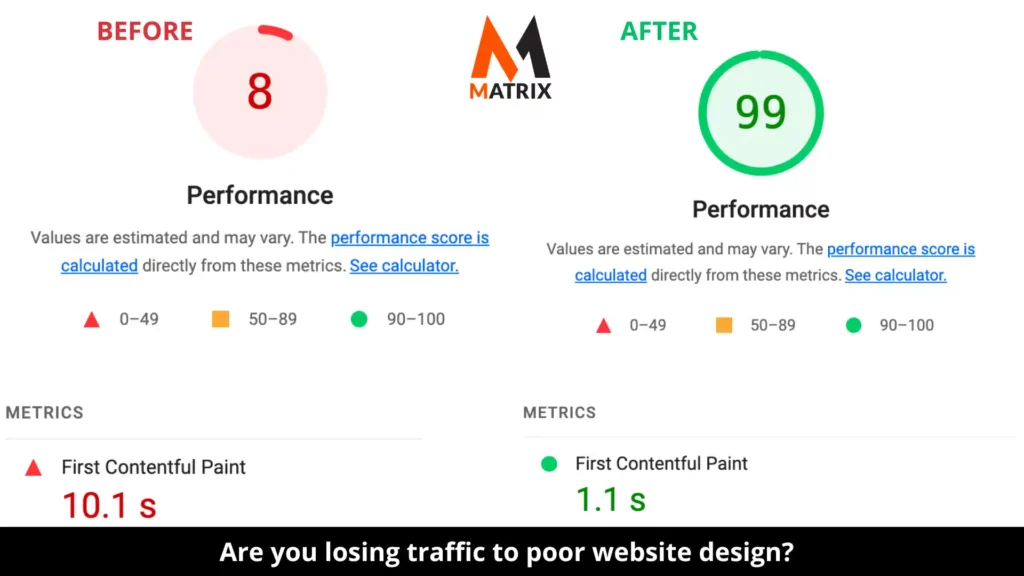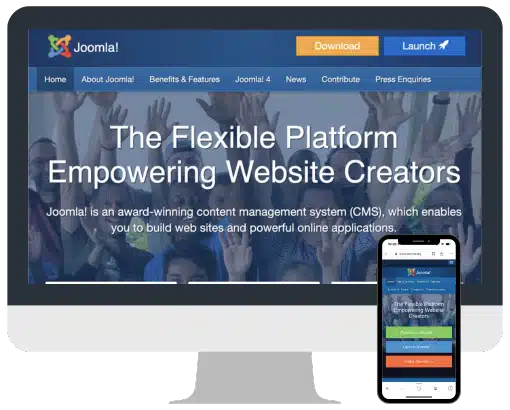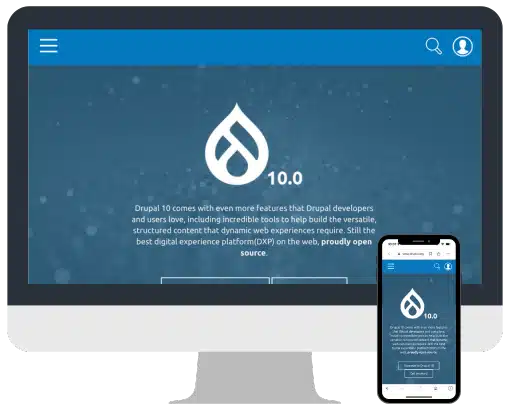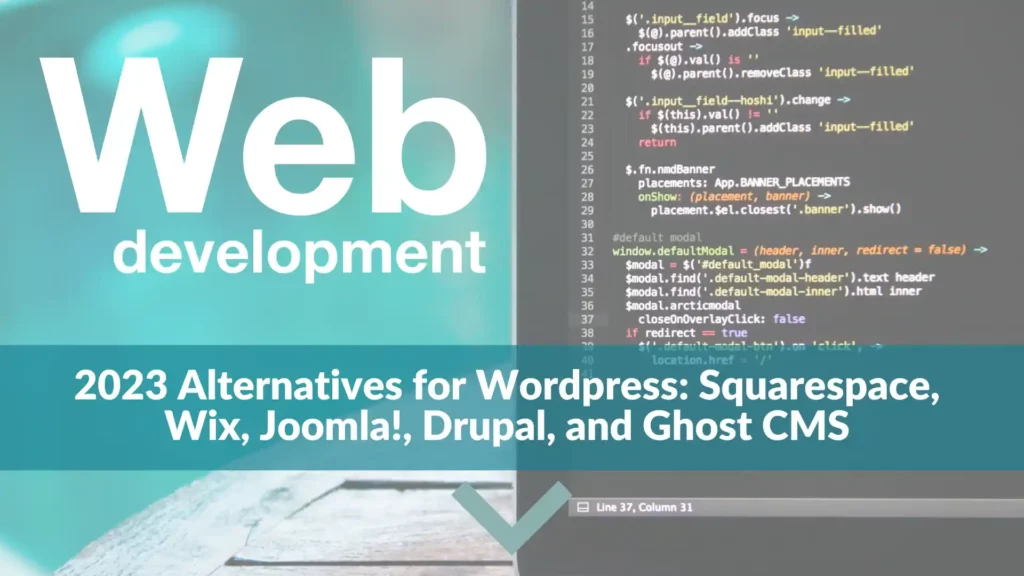Alternatives for WordPress: Squarespace, Wix, Joomla!, Drupal, and Ghost CMS
Learn About The Alternatives for WordPress: Squarespace, Wix, Joomla!, Drupal, and Ghost CMS.
WordPress has been a popular choice for web developers and content creators since its launch in 2003. However, as technology evolves, so do the best alternatives to WordPress. Several strong contenders offer powerful features and improved performance over WordPress.
These alternatives include Squarespace, Wix, Joomla!, Drupal, and Ghost CMS. Each platform offers something unique that could be advantageous compared to WordPress in terms of cost-efficiency, scalability, or user experience.
In this article, we will explore the top 5 WordPress alternatives so you can decide which platform is right for your project needs. But website editors are dead.
Why is using anything other than WordPress asking for trouble?

WordPress has been a reliable web development platform since 2003, but there may not be a better option for some projects. Depending on the specific needs of your project, you could get much better performance and cost-efficiency by opting for one of the WordPress alternatives available in 2023.
For example, Squarespace is more user-friendly than WordPress and offers more built-in design options. Wix is a good choice for those seeking an easy-to-use website builder with plenty of features and tools. Joomla! and Drupal provide powerful scalability and extensibility capabilities, making them great choices for larger projects.
Ghost CMS takes content creation to another level with its modern layout engine and intuitive editing interface.
Using anything other than WordPress can be asking for trouble if you need help understanding the platform’s features or the technology stack behind it.
Many platforms require technical knowledge to set up correctly, optimize performance, and keep up with security updates. Also, additional costs may be involved in hosting these platforms on third-party servers or using advanced custom solutions beyond what WordPress can provide.
Some of these platforms may also need features or plugins that would be easily available through WordPress. Therefore, assessing all aspects before choosing an alternative to WordPress for your project is important. Rethinking AI Website Design in the Age of the Algorithm
Squarespace

Squarespace is a popular website builder that has gained traction since its launch in 2004. Its user-friendly interface and drag-and-drop design capabilities make it easy for people of all technical backgrounds to create beautiful, professional websites without any coding knowledge. It also comes with an extensive selection of pre-made templates and design options, making it easy to create stunning visuals with just a few clicks.
Squarespace provides advanced analytics tools that give detailed insights into visitor data and site performance. Squarespace’s integration with social media platforms allows users to quickly share content across multiple channels. Squarespace offers powerful SEO features that help your website appear on leading search engines.
Regarding scalability and cost efficiency, Squarespace is one of the best alternatives to WordPress. It offers several different pricing plans starting at very affordable prices, allowing businesses of all sizes to find the right fit for their needs. There are also no hidden costs or long-term commitments involved – you pay month-to-month and can cancel at any time.
Overall, Squarespace is an ideal solution for anyone looking for an intuitive web platform that offers great value for money and powerful features without requiring any coding knowledge or experience.
What are the features of Squarespace?

Squarespace offers an extensive selection of features for creating professional and dynamic websites. The platform is easy to use and doesn’t require coding knowledge, making it ideal for beginners or those who want a quick and straightforward website solution.
The drag-and-drop design capabilities allow users to easily customize their website’s layout, apply custom fonts and colors, and add images, videos, galleries, and HTML codes. Additionally, Squarespace offers a wide range of pre-made templates that can be used as a starting point for your website.
For advanced users, Squarespace also provides powerful tools such as CSS-editing capabilities and custom code injections, enabling further customization of the website’s design.
Integration with social media platforms is another great feature offered by Squarespace, which allows content to be shared quickly across multiple channels. Additionally, the platform offers advanced SEO features that help the website appear on leading search engines more easily. It also provides analytics tools that give detailed insights into visitor data, such as page views, clickthrough rates, and other key metrics.
Squarespace includes many other features, such as email marketing with automated campaigns, built-in payment processing through Stripe and PayPal, ecommerce store creation with product listings, and inventory tracking capabilities. It also offers 24/7 customer support to help you with issues or questions regarding the platform or its various features.
Overall, Squarespace provides an extensive selection of features for creating professional websites with ease – from simple static pages to fully functioning online stores – all without requiring any technical expertise or coding experience. UX Website Redesign: Step-by-Step Guide for the Perfect Launch
What are the advantages of Squarespace?
One of the main advantages of Squarespace is its cost-effectiveness. The platform offers several different pricing plans, starting at very affordable prices, allowing businesses of all sizes to find the right fit for their needs.
There are also no hidden costs or long-term commitments involved – you pay month-to-month and can cancel at any time. Additionally, Squarespace includes hosting in all its plans, so purchasing a separate hosting service is unnecessary.
In addition to being cost-effective, Squarespace is highly scalable and can easily be upgraded as your site grows in terms of users, content, or functionality. It also offers various features that make it a great choice for creating professional websites without technical expertise or coding experience.
The platform’s drag-and-drop design capabilities make it easy to customize your website’s layout and apply custom fonts and colors. It also comes with an extensive selection of pre-made templates that can be used as a starting point for your website. It also provides powerful tools such as CSS-editing capabilities and custom code injections, enabling further customization.
Integration with social media platforms further adds to the advantages of Squarespace, allowing content to be shared quickly across multiple channels. Additionally, advanced SEO features help the website appear on leading search engines more easily. At the same time, analytics tools provide detailed insights into visitor data, such as page views, clickthrough rates, and other key metrics.
Squarespace also includes many other features that make it an ideal solution for easily creating professional websites – from simple static pages to fully functioning online stores – without coding knowledge or experience.
Furthermore, 24/7 customer support can help you with issues or questions regarding the platform’s various features.
Squarespace provides powerful features without breaking the bank and allows businesses of all sizes and technical backgrounds to create stunning websites quickly and easily – making it one of the best alternatives for WordPress. A 9 Step-by-Step Guide for Redesigning Your Website
What are the disadvantages of Squarespace?
One of the main disadvantages of Squarespace is that there may be better fits for larger websites or businesses with more complex requirements. For example, users can only access certain features and customizations if they upgrade to a higher-level plan. Additionally, while Squarespace offers a selection of themes and templates, they can be limited compared to other platforms like WordPress or Joomla!
While an App Market is available, it is limited in scope, and many popular applications are unavailable on the platform. Squarespace also has fewer third-party integrations than some other platforms. Customization options such as custom code injections can be laborious and require more technical skills than other website builders.
Additionally, Squarespace’s ecommerce features could be more comprehensive when compared to dedicated ecommerce platforms such as Shopify or BigCommerce. Certain features, such as multiple payment options, detailed shipping rules, and discounts, may not be available on the platform.
Finally, Squarespace websites are usually more expensive to maintain over time due to their closed-source nature and proprietary technology stack since any necessary upgrades must be done manually through the platform’s internal tools -. In contrast, an open-source platform like WordPress would allow developers to use plugins or additional software that could reduce these costs significantly.
Squarespace provides an easy-to-use solution for creating professional websites quickly and cost-effectively. It may not offer enough flexibility or scalability for larger websites or businesses with more complex requirements – making it less ideal than other alternatives, such as WordPress in 2023.
What is WIX?

Wix is a cloud-based web development platform allowing users to create professional websites without coding or technical expertise. It was founded in 2006 and has since become one of the leading website builders, powering over 150 million websites worldwide.
The platform provides an intuitive drag-and-drop interface, making it easy for beginners to design their websites. Wix also comes pre-equipped with a library of high-quality templates, tools, and features tailored toward creating stunning and unique sites from scratch.
Wix provides powerful SEO tools that help optimize your website for search engines. This includes automating SEO processes such as generating sitemaps, setting meta tags, managing redirects, and advanced analytics reports to track user engagement across different channels.
Furthermore, Wix offers extensive third-party integrations that allow businesses to connect their ecommerce store with PayPal or other payment systems, add social media feeds, or incorporate various databases into their site – all in just a few clicks.
In conclusion, with its comprehensive yet user-friendly features and robust functionality, Wix offers one of the best alternatives to WordPress in 2023 – providing businesses of all sizes with an effective way to create beautiful websites quickly and cost-efficiently.
What industries does WIX fit?
Wix suits various industries, including small businesses and entrepreneurs, creative professionals, ecommerce companies, bloggers, etc. The platform provides all the features necessary to easily create stunning and professional websites – from ready-made templates to drag-and-drop editing tools and customized designs. Additionally, with its vast selection of integrations and apps, Wix has the power to help businesses bring their online presence up to speed quickly and easily.
Small businesses can use Wix to create an attractive website that showcases their products or services in style – such as restaurants and cafes that can display mouth-watering meals in full color with galleries and menus; retailers who can offer online shopping experiences; or service providers like coaches or consultants who can showcase their skillsets with custom contact forms.
Thanks to its comprehensive SEO options, small business owners can optimize their websites for higher search engine ranking to reach more potential customers faster.

Creative professionals also benefit from Wix’s powerful features – adding media galleries for showcasing artwork or photography, customizing fonts, colors, and layouts, integrating music players, or designing personal portfolios featuring their best work. With the platform’s blog feature, they can easily keep followers up-to-date on their latest projects – which could result in increased interest from potential clients or employers.
Moreover, ecommerce companies have access to powerful tools for setting up an online store quickly – including integrated payment gateways for accepting credit cards securely, tax calculators for calculating taxes on purchases automatically, shipping rules for controlling delivery costs efficiently, plus options for offering discounts and promotions to customers. These features are available through Wix’s App Market, including free and paid add-ons that make running an online store easier.
Bloggers will appreciate the platform’s intuitive blogging tools that allow them to draft posts quickly while utilizing advanced formatting options, such as adding rich text elements like headings, quotes, or lists without coding knowledge. They can also upload media content directly into posts using drag-and-drop tools and connect social media feeds seamlessly to the blog section of their website.
Overall, Wix is one of the best alternatives to WordPress in 2023 due to its comprehensive yet user-friendly features, making it suitable for various industries ranging from small businesses to creative professionals looking to quickly bring their online presence up to speed.
What are the advantages of using WIX?
One of the biggest advantages of using Wix over WordPress is its ease of use. With its pre-built templates, users can customize their site’s look and feel to create an attractive website without starting from scratch. Even those with no coding experience can use the platform’s drag-and-drop interface to design beautiful websites quickly without needing a web developer for assistance.
They have access to powerful tools such as interactive content blocks, animations, video backgrounds, and more – allowing them to create engaging web experiences that capture visitors’ attention and drive conversions.
Another advantage of Wix is its scalability. Businesses can easily upgrade their account as they grow or add additional features like ecommerce solutions or contact forms without needing comprehensive technical knowledge or large investments in professional services. In addition, those with limited budgets can choose Wix’s free plan, which provides enough resources for small businesses and bloggers just starting.
Finally, Wix provides businesses with great options for customizing their site according to their needs – from setting up customized contact forms, adding Google Maps, and integrating third-party apps.
Your Blueprint for SEO Success in 2025
Whether you’re a business owner, marketer, or seasoned SEO professional, this guide is tailored to give you a competitive edge in the evolving digital landscape. Get SEO Pricing.

What are the disadvantages of using WIX?
One of the main disadvantages of using Wix is that it lacks built-in support for plugins and themes. Users cannot customize their site with plugins or tailor the design to fit their brand’s style. Additionally, it is impossible to integrate third-party software such as Google Analytics or SEO optimization services without incurring additional costs.
Another disadvantage of Wix is its slow loading speed and poor performance for large websites due to its limited hosting resources and the fact that websites are hosted on the same servers as other Wix users. This can greatly impact user experience since visitors will only get access to your website quickly if it takes too long to load.
Moreover, although there are many options for customizing websites with Wix, too many features can lead to a cluttered design, negatively affecting user experience – especially when too many elements compete for attention or if navigation menus become overly complex. As such, users must pay attention to how they structure content on their pages and ensure that only relevant information is featured on each page to keep designs clean and uncluttered.
Finally, unlike WordPress, which offers full control over coding and customization options from the backend, Wix’s proprietary platform handles all coding in Wix sites – meaning users cannot export their site outside of the platform unless they use an external code editor like Adobe Dreamweaver or Notepad++. Therefore, those who want more control over coding features may find WordPress a better option due to its flexibility and features.
Overall, Wix is a great choice for businesses looking to create an online presence quickly without having coding skills or large investments in web development services. However, those needing more advanced customization options or wishing to export their site outside the platform may find WordPress a better alternative.
Joomla!

Joomla! is a content management system (CMS) that enables users to create, manage, and update websites easily. It was released in 2005 and has become one of the most popular open-source CMS platforms due to its user-friendly interface, scalability, and powerful features.
Unlike other web development platforms such as WordPress or Wix, Joomla! Does not come with pre-built templates or drag-and-drop tools; users must manually code their website’s design using HTML and CSS. However, it offers extensive extensions that users can install on their website to add features such as galleries, contact forms, blogs, forums, ecommerce solutions, membership functions, and more.
In addition to its vast selection of features and customizability options, Joomla! is also highly secure. It follows strict security protocols, including regular updates for its core files to keep up with the latest security threats. Furthermore, developers are encouraged to follow best practices when writing code for the platform; this ensures that any third-party extensions used on a site are safe from malicious attacks, including viruses or malware.
Overall, Joomla! is a great choice for those looking for a powerful CMS platform that offers plenty of customization options but needs coding experience or access to professional web development services. Although it may require more manual work than alternatives like WordPress or Wix when setting up a website, its flexibility makes this effort well worth it in the long run.
What industries does Joomla fit?

Joomla! is an extremely versatile platform, making it ideal for any industry that requires a website with powerful features and customization options. It is especially well-suited for businesses managing complex content or requiring ecommerce solutions and organizations such as schools, charities, government agencies, and non-profit organizations.
For example, Joomla! can be used to create membership portals where users can register to access private content and resources or educational websites with course listings, student information systems, event calendars, forums, blogs, and more. It can also be used to build corporate intranets and extranets, which enable employees to share information securely within the organization or collaborate with external partners. Additionally, businesses can leverage its powerful ecommerce tools to quickly set up online stores with multiple payment gateways.
Moreover, Joomla! also offers highly customizable social networking capabilities. This makes it a great choice for building communities such as fan clubs or support groups that require specific functionality, such as private messaging or discussion forums.
Overall, Joomla! is a great choice for any business or organization that needs a feature-rich website without the added cost of custom coding from professional web developers. Its extensive selection of extensions is easy to use, and it has endless possibilities for creating powerful yet user-friendly websites tailored to specific industry requirements.
What are the advantages of using Joomla?
Joomla! offers web developers, content creators, and business owners many advantages. For starters, it is an open-source platform with no license fees, which makes it a cost-effective solution for creating websites. It also has many features and extensions, giving users plenty of customization options when designing their websites.
Another advantage of using Joomla! is its ease of use. Its user interface is intuitive and easy to navigate; this makes it ideal for users who need to become more familiar with coding or web development. The platform’s codebase is also clean and well-organized, making maintenance simple. Furthermore, a large community of active users continually contributes to its development and provides support when needed.
In terms of security, Joomla! Follows a set of strict protocols that help protect websites from malicious attacks, including viruses or malware; this ensures the safety of any data stored on the website and its integrity over time. Additionally, it offers robust access control functions that allow administrators to create different access levels or even create private areas accessible only to specific users.
Finally, Joomla! Offers scalability as well; businesses can easily upgrade their website as their needs change without starting from scratch. This makes it suitable for websites with high traffic or requiring frequent updates and modifications over time.
Overall, Joomla! is a great choice for those looking for a powerful CMS platform with plenty of customization options but who need coding experience or access to professional web development services. Its easy setup process and extensive feature set provide users an efficient way to build dynamic websites tailored to specific industry requirements without sacrificing performance or security.
What are the disadvantages of using Joomla?
Despite its many advantages, Joomla! has some drawbacks to consider. With its open-source nature, anyone can download the code and make modifications; this means that websites created with Joomla! may be vulnerable to security threats if not properly maintained. Additionally, since it is a complex platform with numerous extensions and plugins, website owners must take extra care when installing them; this could create compatibility issues or even break the website if done incorrectly.
Another disadvantage is that Joomla! Does not offer complete control over the design of a website; users must use the predetermined templates provided by the platform, making it difficult to create custom designs from scratch. Furthermore, due to its large codebase, Joomla has long loading times! Sites tend to be slower than CMS platforms such as WordPress or Wix.
Finally, while there’s an active community of users who continuously contribute to the development of Joomla!, finding suitable professional support services can be somewhat challenging; this is especially true for those based in remote areas or countries where qualified developers are scarce.
Overall, before deciding which platform to use for creating their website, business owners should carefully weigh all aspects of each option – including both advantages and disadvantages – to make an informed decision that best suits their specific needs and goals.
Drupal

Drupal is an open-source content management system (CMS) used by millions of websites, from small personal blogs to large enterprises. Launched in 2001, it has become one of the most popular CMS solutions due to its scalability and robust feature set.
What makes Drupal stand out from other CMS platforms is its flexibility. Unlike other CMSs that require users to use predefined templates for their website, Drupal lets users create custom designs through various themes and modules; this allows website owners to tailor the design of their website according to their specific industry requirements or personal needs preferences.
Furthermore, Drupal offers a wide range of features that enable users to manage their websites efficiently. These features include content editing tools, user authentication capabilities, advanced security measures, third-party integration options, multilingual support, and more. Additionally, as an open-source platform, it’s continuously being improved by its active community of developers who are constantly adding new features or improving existing ones.
In terms of performance, Drupal offers great scalability; whether running a small blog or managing a large enterprise website with thousands of pages and visitors daily, the platform can easily handle everything. Additionally, it utilizes caching techniques and optimization tools that further improve loading times; this ensures visitors have a smooth browsing experience no matter how much content they view on your website.
Drupal provides website owners with an extremely powerful tool for creating highly customizable websites no matter what industry they may be in. With its extensive library of themes and modules, as well as advanced security measures – it can easily scale up or down depending on the needs of each business without sacrificing performance or stability.
What industries does Drupal fit?

Drupal is a powerful and flexible CMS that is suitable for a wide range of industries. It can be used to power simple blogs, ecommerce stores, complex enterprise websites, or any other type of website imaginable.
Due to its vast library of themes and modules, Drupal makes it easy to create custom designs tailored specifically to your organization’s needs. This makes it ideal for businesses in industries such as healthcare, retail, education, hospitality and travel, media and entertainment, financial services, manufacturing, and more.
For online retailers, Drupal provides complete control over the user experience with powerful tools such as product management capabilities and integration with third-party payment gateways. Educational institutions can benefit from its multilingual support features to reach a global audience. Hospitals and healthcare organizations can enjoy reliable security measures that protect their data from outside threats. And media companies can easily customize content delivery with built-in features like social media integration.
In addition to its industry-specific features, Drupal offers advanced scalability and performance benefits, making it well-suited for organizations expecting rapid growth in the next few years. With caching techniques and optimization tools designed to improve loading times — businesses can ensure visitors have an enjoyable browsing experience regardless of how much content they view on their website.
What are the advantages of using Drupal?
The advantages of using Drupal are numerous. Firstly, as an open-source platform, Drupal is completely customizable. Website owners can tailor their websites according to their business’s needs without being limited to predetermined options. This can help them create a unique and engaging user experience tailored to their industry.
Secondly, Drupal makes scalability effortless; whether running a small blog or a large enterprise website with thousands of pages and visitors per day, the platform can handle it all without sacrificing performance or stability. Additionally, powerful caching techniques and optimization tools make loading times faster than ever before; this allows visitors to enjoy smooth browsing experiences regardless of how much content they view on your website.
Thirdly, Drupal provides users with advanced security measures that protect their data from outside threats. This includes two-factor authentication, encryption, IP address blocking, password protection, and more. Finally, Drupal also offers multilingual support, which enables organizations to reach a global audience easily.
In conclusion, Drupal provides website owners with an extremely powerful tool for creating highly customizable websites no matter what industry they may be in. With its extensive library of themes and modules, as well as advanced security measures – it can easily scale up or down depending on the needs of each business without sacrificing performance or stability.
What are the disadvantages of using Drupal?
One of the main disadvantages of using Drupal is that it can be difficult for beginner users to understand. The platform has a steep learning curve and requires technical knowledge to configure, manage, and customize websites. Additionally, due to its complex nature, setting up and running a Drupal website can require more time than other CMSs and more experienced developers.
Another disadvantage is that some features may be too advanced for smaller websites with less specialized needs. For example, while Drupal offers an extensive library of themes and modules, they may be too much for smaller businesses that don’t have the resources or need the complexity. Additionally, some third-party integrations are unavailable on Drupal or require extra customization.
While Drupal offers powerful security features such as two-factor authentication and encryption — these features can be hard to configure and manage without the help of an experienced developer or IT team. This could lead to potential vulnerabilities if not set up properly, leaving your website open to attack.
Ghost CMS

Ghost CMS is an open-source content management system (CMS) that focuses on providing users with a streamlined, user-friendly experience. Ghost was created in 2013 as an alternative to existing CMS solutions such as WordPress and provided a modern platform for building and managing websites. Ghost is designed to make website creation fast and easy, allowing you to create a beautiful website without coding quickly.
The platform is ideal for bloggers, entrepreneurs, and small business owners who want to build a professional-looking site without worrying about complicated technical details. It offers a variety of tools, such as drag-and-drop page builders and editing features that allow users to customize their website design with ease. Ghost has built-in SEO features that help ensure your pages are optimized for search engine visibility.
Ghost CMS is a WordPress alternative open-source and is included as one of our WordPress alternatives 2023.
The platform also offers powerful integrations with popular applications such as Google Analytics and Mailchimp, so you can easily track your website’s performance and communicate with your customers or followers. Security is another key feature of Ghost — the platform offers advanced security measures such as encryption algorithms, two-factor authentication, IP address blocking, password protection, and WordPress blog alternatives.
Ghost is a great choice for businesses and bloggers looking for an easy way to create stunning websites without worrying about complicated technical details. Modern design tools allow users to customize their websites according to their needs, while the built-in SEO features can help improve search engine visibility. Effective security measures ensure your data remains safe from outside threats.
What industries does Ghost CMS fit?
Ghost CMS is a great choice for businesses and bloggers looking for an easy way to quickly create professional-looking websites without worrying about complicated technical details. Ghost is ideal for e-commerce, media, education, hospitality, finance, real estate, and more industries. It offers an array of features, such as intuitive drag-and-drop page builders. These built-in SEO features improve search engine visibility and powerful security measures like encryption algorithms and two-factor authentication.
Ghost CMS can be easily adapted to fit any business’ needs no matter what size or industry they may be in. The platform allows developers to create custom themes and plugins tailored to their client’s needs. Additionally, Ghost offers extendable API integrations with popular applications such as Google Analytics, MailChimp, and more – allowing users to customize their websites even further.
For those in the education industry – Ghost’s advanced customization options make it particularly suitable for creating student portals with interactive courses, quizzes, and projects. Media companies can also take advantage of Ghost’s powerful alternatives to wordpress for blogging platforms by using it to write articles, reviews, or other content that can be easily shared across social media networks.
Ghost CMS is perfect for small businesses looking for a cost-effective solution without sacrificing performance or scalability. The platform is lightweight yet powerful enough to handle large websites with intense traffic loads without crashing or slowing down the system – making it perfect for businesses requiring high reliability levels.
What are the advantages of using Ghost CMS?
Ghost CMS has several advantages that make it an attractive alternative to WordPress. Ghost is extremely user-friendly and offers a sleek, modern interface that makes website creation fast and easy.
It offers intuitive drag-and-drop page builders and editing features that allow users to customize their website design quickly and easily without coding knowledge. Ghost is SEO friendly, offering robust SEO tools like URL optimization, meta tags, structured data markup integration, and more – helping ensure your pages are optimized for search engine visibility.
Security is another major advantage of Ghost CMS. The platform utilizes advanced encryption algorithms, two-factor authentication, IP address blocking, password protection, and more – giving you peace of mind knowing your data remains safe from outside threats.
Lastly, Ghost CMS is highly extensible, with powerful integrations with popular applications such as Google Analytics, MailChimp, and more, allowing users to customize their websites further according to their needs. The platform also supports custom themes and plugins tailored to clients’ needs.
Content That Converts: Transparent Pricing for Maximum ROI
Explore Matrix Marketing Group’s Flexible Pricing Plans for Premium Content and Marketing Solutions Tailored to Your Goals.
What are the disadvantages of using Ghost CMS?
One of the major disadvantages of using Ghost CMS is that it lacks certain features included in WordPress, such as multisite capabilities and multi-language support. Additionally, while Ghost CMS offers basic SEO optimization tools out of the box, more advanced users may find certain options lacking compared to WordPress’s extensive SEO extensions and plugins.
Another potential drawback for some users is Ghost’s limited customization options. While Ghost does offer a simple drag-and-drop page builder, it doesn’t provide access to HTML or CSS code – meaning developers won’t be able to create custom themes from scratch. It also has fewer plugins than WordPress, so users may find themselves limited in terms of what features they can add to their website.
Finally, another potential downside for some businesses is cost. While Ghost does offer an affordable option for small businesses, its higher-tier plans are more expensive than those offered by WordPress – making it less attractive for those on a tight budget.
Overall, while Ghost CMS is a great choice for many businesses and bloggers looking for an easy way to create stunning websites quickly and without having to worry about complicated technical details – its lacks of certain features and customization options (compared to WordPress), as well as its higher price point, could make it less attractive for some users.
Packaged offering by Matrix Marketing Group with WPengine and FROST

The Matrix Marketing Group provides a comprehensive package for WordPress users looking for an easy, cost-effective way to take their website to the next level. The package includes WPengine hosting and FROST (Fast Resource Optimized System Templating), which offer powerful features and improved performance over standard WordPress installations.
WPengine offers secure hosting services that are optimized for speed and performance. Its cloud-based platform is designed to scale your business while delivering a fast and reliable experience to site visitors. WPengine’s custom caching systems help reduce page load times, increase user engagement, and improve SEO potential.
FROST is an advanced templating system that enables developers to quickly create custom web pages using pre-defined templates and style sheets. FROST also allows developers to add content elements like images, text blocks, video embeds, and more – without worrying about coding or complex technical details. This makes it easy to create dynamic website experiences tailored specifically for the end user’s needs – all at a fraction of the time it would take with WordPress.
Combined with the power of WPengine’s hosting services, this package from Matrix Marketing Group provides users with an efficient solution for creating engaging websites that perform well in terms of speed and scalability. This makes it ideal for businesses looking for an easy way to build beautiful sites quickly and easily – all within a cost-effective budget.
WordPress Market Share
- WordPress has the biggest CMS market share.
- Out of all the websites that use a known CMS, 45% of those sites use WordPress.
- WordPress had a 64.2% share of the global CMS market in 2022.
- It is estimated there are 34,896,678 live WordPress websites.
- There are over three million five hundred thousand WordPress blogs and websites in the US alone.
- Regarding the top 1 million sites based on traffic, 28.7% use WordPress open-source software.
- 29.65% of the top 100 thousand websites use WordPress, and 29.41% of the top 10 thousand sites run on WordPress.
- The WordPress CMS market share has grown from 55.3%-64.2% between 2011 and 2022, an 8.9% increase.
WordPress is the world’s most popular CMS, and that seems unlikely to change anytime soon.
Building a website can be time-consuming and expensive, especially if you don’t have the technical know-how or resources to do it yourself.
Even with WordPress, creating a stunning website that performs well in speed and scalability is no easy task. You need reliable hosting services and advanced templating systems to ensure your site looks great and runs smoothly.
Matrix Marketing Group has the perfect solution for businesses looking for an easy way to create engaging websites quickly and cost-effectively.
Our package includes WPengine hosting and FROST (Fast Resource Optimized System Templating), which offer powerful features and improved performance over standard WordPress installations. With our package, you get everything you need to build beautiful sites without worrying about complicated technical details or breaking the bank!
Drive Better Results with a Complimentary Marketing Audit
Take the guesswork out of your marketing strategy. Our Free Marketing Audit is designed to analyze your current efforts, identify gaps, and uncover growth opportunities. Whether you’re struggling with low ROI, limited engagement, or unclear targeting, we’ll provide actionable insights to help you achieve your business goals.

Conclusion
WordPress remains the best platform for web developers and content creators in 2023 due to its extensive features, customization options, scalability, cost-efficiency, and user experience.
While some strong competitors offer powerful alternative solutions such as Squarespace, Wix, Joomla!, Drupal, and Ghost CMS – none of them can match WordPress’s comprehensive suite of tools or ability to scale with business growth.
Self-hosted wordpress alternatives and most are WordPress alternatives free.
Furthermore, Matrix Marketing Group offers a package that combines WPengine hosting services with FROST templating system, making it easy for users to create stunning websites quickly without worrying about coding or complex technical details – all within an affordable budget.
For these reasons (and more), WordPress is still the go-to choice for businesses looking to build beautiful sites quickly and easily in 2023.
General FAQs
What is WPengine, and why should I use it?
WPengine is a hosting service optimized for speed and performance, designed to scale your business while delivering a fast and reliable experience to site visitors. It also has built-in custom caching systems that help reduce page load times, increase user engagement, and improve SEO potential. This makes it ideal for businesses looking for an easy way to build beautiful sites quickly and easily within a cost-effective budget.
What is FROST?
FROST (Fast Resource Optimized System Templating) is an advanced templating system that enables developers to quickly create custom web pages using pre-defined templates and style sheets. It also allows developers to add content elements like images, text blocks, video embeds, and more – without worrying about coding or complex technical details. This makes it easy to create dynamic website experiences tailored specifically for the end user’s needs – all at a fraction of the time it would take with WordPress.
Why is WordPress still the best platform in 2023?
WordPress remains the best platform in 2023 due to its extensive features, customization options, scalability, cost-efficiency, and user experience. It offers a comprehensive suite of tools that allow users to customize their websites according to their needs and budget while also providing scalability options that enable businesses to grow without starting from scratch with a new platform.
What package does Matrix Marketing Group offer?
Matrix Marketing Group offers a package that combines WPengine hosting services with FROST templating system. This package provides businesses with an efficient solution for creating engaging websites that perform well in speed and scalability – all within an affordable budget! With this package, users get everything they need to build beautiful sites quickly and easily without worrying about complicated technical details or breaking the bank!

